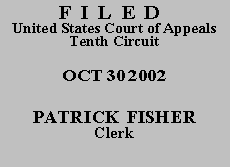

| LARRY WAYNE KEY,
Petitioner - Appellant, v. STEPHEN W. KAISER, Respondent - Appellee. |
|
Petitioner Larry Wayne Key, an Oklahoma state prisoner proceeding pro se, requests a certificate of appealability (COA) to challenge the district court's order denying his petition for a writ of habeas corpus filed pursuant to 28 U.S.C. § 2254. See 28 U.S.C. § 2253(c)(1)(A) (no appeal unless COA issued). We deny issuance of a COA and dismiss the appeal.
Mr. Key was convicted by a jury of seven counts of feloniously pointing a weapon and one count of carrying a weapon in a beer tavern. He was sentenced to twenty years on each count, some of which run concurrently and some consecutively, for a total sentence of forty years. His convictions were affirmed on direct appeal and his motions seeking post-conviction relief from the state courts were denied. He then filed the underlying federal habeas petition, which was also denied.
The facts underlying Mr. Key's convictions were based on his actions on October 6, 1995. He and his wife had a few drinks at an Oklahoma bar and left. Some time later, Mr. Key returned to the bar, carrying a rifle. He pointed the gun at several people in the bar until he was grabbed by another patron. He then left the bar with the rifle. That same evening at a skating rink around the corner from the bar, a man pointed a rifle at some teenagers who were waiting for a ride home. The charges against Mr. Key were based on his pointing a rifle at the people in the bar and at the skating rink.
Mr. Key filed his notice of appeal more than thirty days after the district court denied his habeas petition. See Fed. R. App. P. 4(a). The time to appeal begins when a judgment is formally entered as a separate document under Fed. R. Civ. P. 58(a). Thompson v. Gibson, 289 F.3d 1218, 1221 (10th Cir. 2002), petition for cert. filed, (U.S. Aug. 12, 2002) (No. 02-5944). Here, no formal judgment was entered; therefore, "the time for filing a notice of appeal has yet to run." Id. Consequently, we have jurisdiction over this appeal.
On appeal Mr. Key maintains that he is entitled to habeas relief on the following grounds for which he seeks a COA: (1) prosecutorial misconduct prevented him from receiving a fair trial and was fundamental error, (2) the evidence was insufficient to support the convictions on Counts I and VI, (3) the prosecution failed to prove that his prior felony convictions were final, (4) his state post-conviction motion filed June 12, 1998, was denied in violation of his constitutional rights, (5) the convictions for pointing a deadly weapon and carrying a firearm in a tavern violate state law and the constitutional prohibition against double jeopardy, (6) the information charging him with felonies was invalid because the prosecution charged two separate, distinct, unconnected crimes (the "tavern incident" and the "skating rink incident"), (7) Count VII failed to charge an offense, (8) his trial attorney provided ineffective assistance, and (9) his appellate attorney provided ineffective assistance because he failed to raise the issue of trial counsel's ineffectiveness. Mr. Key alleges his trial attorney was ineffective because she (a) requested a continuance, thereby permitting the prosecution to locate a damaging witness, (b) failed to request that the two separate incidents be tried separately, (c) failed to request a directed verdict at the close of the state's case on Counts I and VII, (d) failed to call three defense alibi witnesses, (e) failed to object to two jurors, one of whom had personal knowledge of Mr. Key from encounters at the tavern in question, and another who was a relative of two of the victims, (f) failed to object to the introduction of other crimes, (g) failed to challenge the credibility of two witnesses, and (h) failed to communicate with her client and to conduct a proper investigation and prepare a defense.
The district court evaluated some of Mr. Key's claims on the merits. The remaining claims were procedurally barred and Mr. Key did not demonstrate cause and prejudice or a fundamental miscarriage of justice to authorize the court to consider the merits of those claims. See Coleman v. Thompson, 501 U.S. 722, 750 (1991). We have reviewed the district court's rulings on the merits to see if Mr. Key "demonstrate[d] that reasonable jurists would find the district court's assessment of the constitutional claims debatable or wrong." Slack v. McDaniel, 529 U.S. 473, 484 (2000). In considering the district court's procedural rulings, we inquire whether Mr. Key "show[ed] that jurists of reason would find it debatable whether the petition states a valid claim of the denial of a constitutional right and that jurists of reason would find it debatable whether the district court was correct in its procedural ruling." Id.
With these standards in mind, we have carefully reviewed Mr. Keys' briefs and the record on appeal, including the state trial transcripts. For substantially the same reasons underlying the district court's careful and thorough order denying habeas relief dated October 31, 2001, we conclude that petitioner has not made a "substantial showing of the denial of a constitutional right," and is not entitled to a COA. 28 U.S.C. § 2253(c)(2).
The application for issuance of a COA is denied. Appeal DISMISSED. The mandate shall issue forthwith.
Entered for the Court
Circuit Judge
*. This order and judgment is not binding precedent, except under the doctrines of law of the case, res judicata, and collateral estoppel. The court generally disfavors the citation of orders and judgments; nevertheless, an order and judgment may be cited under the terms and conditions of 10th Cir. R. 36.3.